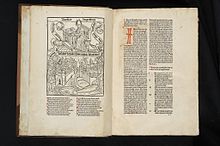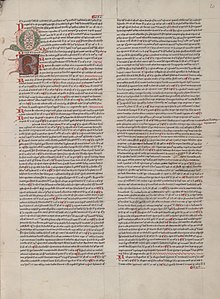The City of God
On the City of God Against the Pagans (Latin: De civitate Dei contra paganos), often called The City of God, is a book of Christian philosophy written in Latin by Augustine of Hippo in the early 5th century AD.[1] As a work of one of the most influential Church Fathers, The City of God is a cornerstone of Western thought, expounding on many questions of theology, such as the suffering of the righteous, the existence of evil, the conflict between free will and divine omniscience, and the doctrine of original sin.Despite Christianity's designation as the official religion of the Empire, Augustine declared its message to be spiritual rather than political.The Earthly City, on the other hand, consists of people who have immersed themselves in the cares and pleasures of the present, passing world.This concept of world history guided by Divine Providence in a universal war between God and the Devil is part of the official doctrine of the Catholic Church as most recently stated in the Second Vatican Council's Gaudium et Spes document: "The Church ... holds that in her most benign Lord and Master can be found the key, the focal point and the goal of man, as well as of all human history ... all of human life, whether individual or collective, shows itself to be a dramatic struggle between good and evil, between light and darkness ...

City of God (disambiguation)Augustine of HippoChristian philosophyChristian theologyNeoplatonismtheologyWestern Roman EmpireDewey DecimalLC ClassWikisourceAugustinianismDivine commandAmillennialismOriginal sinAugustinian predestinationInvisible churchIncurvatus in seAugustinian hypothesisJust warAugustinian theodicyAllegorical interpretations of GenesisConfessionsOn Christian DoctrineSoliloquiesEnchiridionOn the TrinityHarmony of the GospelsPlotinusSaint MonicaAmbrosePossidiusAnselmAquinasBonaventureLutherCalvinJansenNewmanRule of Saint AugustineAugustiniansPelagianismPresentism (historical analysis)Philosophical presentismScholasticismJansenismOrder of Saint AugustineGreat Schism of 1054Theory of formsForm of the GoodHypostasisDemiurgeAnima mundiHenosisTheurgyOkhemaMicrocosm and macrocosmEnneadsDe Mysteriis AegyptiorumLiber de CausisThe Consolation of PhilosophyDe Coelesti HierarchiaDe divisione naturaeChaldean OraclesstudentsPorphyryIamblichusJulian the ApostateHypatiaMacrobiusProclusPseudo-DionysiusSimplicius of CiliciaBoethiusDavid the InvincibleMaximus the ConfessorJohannes Scotus EriugenaAl-FarabiBrethren of PuritySolomon ibn GabirolIsaac the BlindMichael PsellosThierry of ChartresGemistus PlethoMarsilio FicinoGiovanni Pico della MirandolaGiordano BrunoCambridge PlatonistsThomas TaylorRoman IngardenPlatonismin the RenaissancePlatonic AcademyMiddle PlatonismKabbalahSpiritualityIsma'ilismAllegorical interpretations of PlatoPlato's unwritten doctrinesNeoplatonism andChristianityGnosticismdecline of RomeThe ConfessionsThe EnchiridionChurch FathersWestern thoughtexistence of evilfree willsack of RomeVisigothstraditional Roman religionChristianityHeavenLate Antiquityofficial religion of the EmpireNew Jerusalemhuman historyProvidenceCatholic ChurchSecond Vatican Council'sGaudium et Spessack of Rome by the GaulsPlatonistsnatural theologyApuleiusHermeticismGenesis